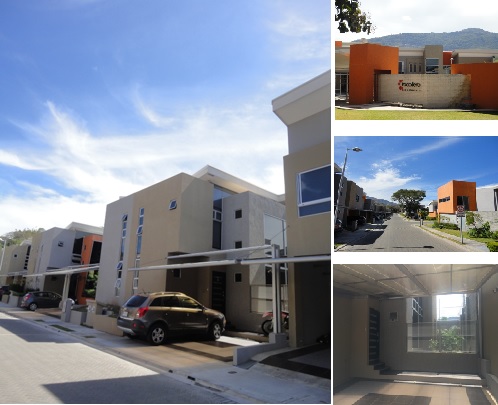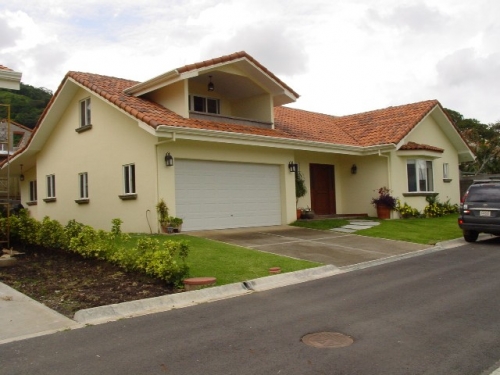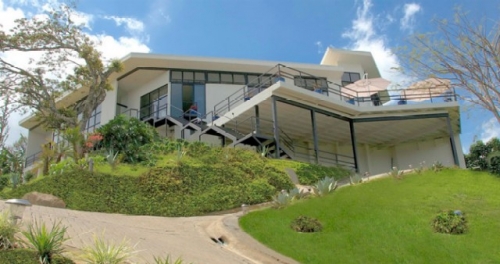Costa Rica Guide
Costa Rica Real Estate
List your property today!
Inclusion of real estate listings at Costa Rica Guide is
absolutely free of charge.
Featured Properties
Costa Rica Guide - Costa Rica Real Estate
What to Expect when Investing in Miniscule Costa Rica Market
Opportunities, Profits - and Hard Work
By Peter Brennan
The Tico Times
March 17, 1995
When Barings Securities made a $7.3 million purchase of stock in Costa Rica's Corporación BCT in December, it was the largest purchase private-sector stocks in the history of the National Stock Exchange. (Fortunately, this had nothing to do with the recent collapse of London-based Barings Bank because of reckless gambling on market futures by the Bank's Singapore manager).
In the world of investments, Costa Rica is the equivalent of a lemonade stand.
It might be very good lemonade, but no investor in Costa Rica should be lulled into believing that there are millions of dollars available in easy profit. This is not a huge market like Brazil, or an investor-friendly place like Chile.
Any businessman here will tell you profits can be made, but the old-fashioned way - with a lot of work.
The risks are not as high as in unstable Nicaragua or Peru, but they are certainly not as low as they would be if you invested in German marks or U.S. T-bills. Investors in Costa Rica should keep in mind the following:
Costa Rica is a small-scale market of 3.3 million residents, about the same population as the Miami-Fort Lauderdale metropolitan area. Furthermore, the average per capita income in 1994 was $2,566, far below the $22,470 of the average U.S. citizen in 1991.
This low per capita causes businessmen to shake their heads in wonder at all the shopping malls springing up around the Central Valley, and wonder where they'll obtain their clients.
Thus any company that requires a sizeable investment will most likely look for foreign consumers as well as domestic. That means export or tourism markets.
The good news for exporters is that markets are becoming freer than ever.
The bad news is that Costa Rica's biggest markets, the United States and the European Union, may carry out threats that leave local businessmen aghast, such as the European Union's new quota system for bananas from Latin America or the U.S. governments' threats against Costa Rica over its labor practices or the way it handles expropriation cases.
The good news for tourism is that the nation's popularity continues to grow in leaps and bounds in the United States and Europe. The bad news is a glut of hotel rooms and tours in certain areas like the Central Valley. It's obvious during the low season of May through October, when some hotels are forced to cut their room rates in half.
In the field of passive investments, Costa Rica has two stock exchanges: the National Stock Market and the Electronic Stock Market. Both feature high-tech computers moving financial instruments; however, the owners are different and commissions vary among the brokers.
They offer a variety of instruments, such as certificates of deposits or internal debt bonds or tax credit certificates (see chart, Page 26).
The stock market is overwhelmingly geared towards the purchase of government-issued instruments. In the 1993-94 fiscal year, the National Stock Exchange reported that 86.61 percent of its transactions were in the public sector.
That's because investors would rather put their funds into bonds that provide interest rates over 30 percent in colones, with the only risk that the government goes belly up (hardly likely), or that inflation/devaluation make it not worthwhile. But the government, to attract these funds, keeps interest rates attractive.
Inflation and devaluation in Costa Rica often follow a predictable cycle: high in the year preceding and following elections, then dropping once the government gets its spending under control by the second year of its administration.
The economy is opening and now is being flooded with imports, and Costa Rican companies find themselves needing to compete. But they are generally unable to afford domestic loans, which often top 40 percent interest rates.
As a result, to raise capital, more and more are offering stocks, such as Atlas Electric, the supermarkets Más X Menos and Periféricos, the nation's preeminent newspaper La Nación and even an exotic venture in the Rainforest Aerial Tram. Currently, the Costa Rican National Securities Commission lists over 120 companies registered to publicly sell stocks.
Stock brokers say Costa Ricans are so accustomed to government bonds with guaranteed profits that they are bypassing stocks which don't have fixed earnings. Tico investors might be making a mistake by not taking into account the growing value of companies' stock, say the brokers.
A big risk is that companies often feel pressure to declare profits competitive with government bonds. Whether it's healthy or even possible for companies to sustain annual growth and profit levels over 30 percent should be a serious question for the investor.
Investors should not be impressed when a company claims it is "registered." The firm might be registered in the Public Registry, but that's as easy as going to the grocery store to purchase corn flakes. These are off-the-shelf companies.
To sell shares, which means advertising to the general public, the company must be registered with the National Securities Commission (Comisión Nacional de Valores). Companies that make a limited offer of shares to only a few investors do not have to register.
Registration is no guarantee of profits or solvency or honesty. But it is a legal record of how many shares have been offered and sold, something that many unregistered companies do not specify.
When contacting the Commission, ask for an English-speaker if you don't speak Spanish. The key question to ask: Is this company that's offering shares to the public now registered with this commission?
If the answer's no, don't invest.
The Commission is located at on the second floor of the Jimenez de la Guardia building on Ave. 5 between Call 1 and 3 (25 meters east of Radiográfica). Its phone numbers are 233-2840, 233-2841, 233-0911 or fax 233-0969. The mailing address is Comisión Nacional de Valores, Apdo. 10058-1000, San José.
As in any country, a lot of promises are made to investors in Costa Rica.
Investors must be aware that it's more difficult to pursue civil or criminal proceedings in Costa Rica than in the United States or other industrialized nations.
The judicial system is ill equipped to handle financial fraud cases; cases brought forward often spend years in court and plaintiffs may win judgments, but have an extremely difficult time collecting on them.
Furthermore, lawyers will demand fees up front to pursue a case. Investors who feel they have been wronged can easily spend thousands more dollars pursuing their case through the courts.
For medium-scale investments, real estate is perhaps one of the safest, although there is lot to be careful about (see separate story).
Various types of business chambers exist, such as the Chamber of Exporters (224-8397, fax 225-6779), the Chamber of Commerce (221-0005), the Chamber of Industries (223-2411; fax 221-2503). Most concentrate on defending the interests of their members before the government. Few give advice on investing.
One of the best books in the field is Costa Rican-North American Chamber of Commerce's Guide to Investing and Doing Business in Costa Rica (tel: 220-2200; fax: 220-2300). AmCham also offers an excellent bilingual dictionary on "Glossary of Financial and Accounting Terms, English/Spanish."
For large-scale investments (over $500,000), contact the private sector Costa Rican Coalition for Development Initiatives (CINDE) at 220-0036 or fax at 220-0290.
The government's Center for Promotion of Exports and Investments can be reached at 221-7166 or fax at 223-5722.
Copyright 1995
Note: The above information is not to be used for any other purpose other than private study, research, criticism or review. Thank you.






